
December 2
1804 Napoleon crowned emperor: In Notre Dame Cathedral in Paris, Napoleon Bonaparte is crowned Napoleon I, the first Frenchman to hold the title of emperor in a thousand years. Pope Pius VII handed Napoleon the crown that the 35-year-old conqueror of Europe placed on his own head. [For further details, Click here.]
1823 Monroe Doctrine declared: During his annual address to Congress, President James Monroe proclaims a new U.S. foreign policy initiative that becomes known as the "Monroe Doctrine." Primarily the work of Secretary of State John Quincy Adams, the Monroe Doctrine forbade European interference in the American hemisphere but also asserted U.S. neutrality in regard to future European conflicts. [For further details, Click here.]
1852 France: On the one-year anniversary of his dissolution of the Second French Republic, Louis-Napoleon Bonaparte declares himself Emperor of the French and took the name Napoleon III. [For further information, click here]
1896 Birth: Georgi K. Zhukov—marshal of Moscow and Stalingrad; Soviet general who will capture Berlin during World War II.
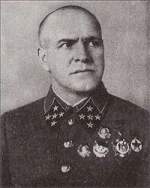
Known for his tactical and strategical abilities, Georgi K. Zhukov was the most outstanding Russian commander during World War II. Born a peasant, Zhukov spent his life in the army, first in the Russian Imperial Army (1915) and then in the Red Army (after 1918). He studied military tactics in Germany in the 1920s and saw action against the Japanese during the Manchurian border clashes of the late 1930s. During World War II he was instrumental in the defense of Leningrad and Stalingrad, then commanded the Russian army in the offensive against German forces, finally accepting the Nazi surrender in Berlin on May 8, 1945. Zhukov emerged from the war as one of Russia's biggest war heroes. After the war he served in administrative posts and retired in 1957.
1899 Colonial Scramble: The US and Germany agree to divide Samoa between them. 1914 World War I: Various:
Serbia: Reinforced Austrian army troops occupy Belgrade.
Adolf Hitler is awarded the Iron Cross, second class, for bravery under fire.
1917 World War I: Russia reaches armistice with the Central Powers:
A day after Bolsheviks seize control of Russian military headquarters at Mogilev, a formal ceasefire is proclaimed throughout the battle zone between Russia and the Central Powers.
Immediately after their accession to power in Russia in November 1917, the Bolsheviks, led by Vladimir Lenin, had approached the Central Powers to arrange an armistice and withdraw from a war they saw as the major obstacle to their plan of providing food and land to the long-impoverished Russian peasant population. Leon Trotsky, in charge of foreign affairs, pressed Britain and France to open peace negotiations, threatening to make a separate armistice if his demands went unmet. After no response from the Allies, the Bolsheviks went ahead with their plan and made an appeal for peace that was welcomed by both Germany and Austria.
As a result of the ensuing negotiations at Brest-Litovsk, concluded in March 1918 after three months of debate and even renewed fighting in some areas, Russia would lose a million square miles of its territory, a third of its population, a majority of its coal, oil, and iron stores, and much of its industry. Lenin insisted that his Congress of Soviets accept the "shameful peace," as he called it, "in order to save the world revolution" and "its only foothold — the Soviet Republic." (History.com)
1924 Weimar: Britain and Germany sign a trade agreement.
1932 Various:
Chaco War: Bolivia accepts Paraguay's terms for a truce. Note: Anyone paying attention could probably explain why this item is included.

Weimar: The sixteen-day Cabinet crisis ends with Hindenburg appointing the ambitious General von Schleicher as Chancellor.
1933 Various:
Romania: The Jewish Self-defense Organization repulses Iron Guard attacks on the Jewish quarter of Jassy.
Liverpool: British Fascists paint swastikas on Princes Road Synagogue.
1935 Various:
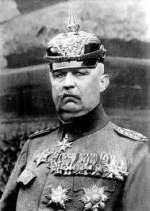
Church and Reich: An order is issued by the Bavarian Gestapo forbidding all public meetings and lectures of Ludendorff's "heathen" movement. The edict is later extended to cover Professor Jakob Wilhelm Hauer's German Faith movement as well.
Holocaust: A number of American colleges and universities urge US athletes to boycott the Berlin Olympics.
1936 From a conference, attended by Goering and Generals Milch, Kesselring, Rudel, Stumpff, Christiansen:
World press excited about the landing of 5,000 German volunteers in Spain. Official complaint by Great Britain; she gets in touch with France. Italy suggests that Germany and Italy send, each, one division ground troops to Spain. It is, however, necessary that Italy, as interested Mediterranean power, issue a political declaration first. A decision can be expected only within a few days. The general situation is very serious. Russia wants the war. England rearms speedily. Command therefore: Beginning today highest degree of readiness regardless of financial difficulties. Goering takes over full responsibility. Peace until 1941 is desirable. However, we cannot know whether there will be implications before. We are already in a state of war. It is only that no shot is being fired so far.
1938 Holocaust: Jews in Danzig are ordered to contribute to the "atonement" fine of one billion Reichsmarks imposed on German Jews after Kristallnacht.
1939 World War II: Finland: Various:
State Secretary in the German Foreign Office (Weizsaecker) to German Missions Abroad:
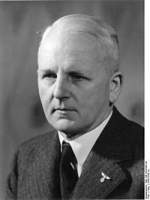
In your conversations regarding the Finnish-Russian conflict please avoid any anti-Russian note. According to whom you are addressing, the following arguments are to be employed: The inescapable course of events in the revision of the treaties following the last Great War. The natural requirement of Russia for increased security of Leningrad and the entrance to the Gulf of Finland. The foreign policy pursued by the Finnish Government has in the last few years stressed the idea of neutrality. It has relied on the Scandinavian states and has treated German-Russian opposition as axiomatic. As a result Finland has avoided any rapprochement with Germany and has even rejected the conclusion of a non-aggression pact with Germany as compromising, even though Finland has a non-aggression pact with Russia. Also in the League of Nations, Finland, in spite of the debt of gratitude which she owed to Germany for the latter's help in 1918, has never come out for German interests. Foreign Minister Holsti is typical of this point of view and particularly hostile to Germany. Extensive elements in Finland emphasize their economic and ideological orientation in the direction of democratic England. Correspondingly the attitude of most of the organs of the press is out-spokenly unfriendly to us. The platonic sympathy of England has confirmed Finland in her previous attitude and has done the country no good.
Finland appeals to the League of Nations to mediate in their dispute with the Soviets.
1941 Countdown to Infamy: US Naval Intelligence ceases bugging the Japanese consul.
The Japanese task force—already underway in the North Pacific—receives a coded message issuing the order to attack Pearl Harbor in Hawaii.
Tokyo to Honolulu:
In view of the present situation, the presence in port of warships, airplane carriers, and cruisers is of utmost importance. Hereafter, to the utmost of your ability, let me know day by day. Wire me in each case whether or not there are any observation balloons above Pearl Harbor or if there are any indications that they will be sent up. Also advise me whether or not the warships are provided with anti-mine nets.
Washington to Tokyo (Part 1 of 2):
Today, the Ambassador KURUSU and I had an interview with Under-Secretary of State WELLES. At that time, prefacing his statement by saying that it was at the direct instruction of the President of the United States, he turned over to us the substance of my separate wire #1233. Thereupon we said: "Since we haven't been informed even to the slightest degree concerning the troops in French Indo-China, we will transmit the gist of your representations directly to our Home Government. In all probability they never considered that such a thing as this could possibly be an upshot of their proposals of November 20th." The Under-Secretary then said: "I want you to know that the stand the United States takes is that she opposes aggression in any and all parts of the world." Thereupon we replied: "The United States and other countries have pyramided economic pressure upon economic pressure upon us Japanese. (I made the statement that economic warfare was even worse than forceful aggression.) We haven't the time to argue the pros and cons of this question or the rights and wrongs. The people of Japan are faced with economic pressure, and I want you to know that we have but the choice between submission to this pressure or breaking the chains that it invokes. We want you to realize this as well as the situation in which all Japanese find themselves as the result of the four-year incident in China; the President recently expressed cognizance of the latter situation.
Washington to Tokyo (Part 2 of 2):
Furthermore, I would have you know that in replying to the recent American proposals, the Imperial Government is giving the most profound consideration to this important question which has to do with our national destiny. Under-Secretary of State WELLES said: "I am well aware of that." I continued: "We cannot overemphasize the fact that, insofar as Japan is concerned, it is virtually impossible for her to accept the new American proposals as they now stand. Our proposals proffered on the 21st of June and the proposals of September 25th, representing our greatest conciliations based on the previous proposal, still stand. In spite of the fact that the agreement of both sides was in the offing, it has come to naught. At this late juncture to give a thoughtful consideration to the new proposals certainly will not make for a smooth and speedy settlement of the negotiations. Recently, we promised to evacuate our troops from French Indo-China in the event of a settlement of the Sino-Japanese Incident and the establishment of a just peace in the Far East. In anticipating the settlement of fundamental questions, the question of the representations of this date would naturally dissolve." The Under-Secretary assiduously heard us out and then said: "The American proposals of the 26th were brought about by the necessity to clarify the position of the United States because of the internal situation here." Then he continued: "In regard to the opinions you have expressed, I will make it a point immediately to confer with the Secretary." I got the impression from the manner in which he spoke that he hoped Japan in her reply to the American proposals of the 26th would leave this much room. Judging by my interview with Secretary of State HULL on the 1st and my conversations of today, it is clear that the United States, too, is anxious to peacefully conclude the current difficult situation. I am convinced that they would like to bring about a speedy settlement. Therefore, please bear well in mind that this fact in your considerations of our reply to the new American proposals."
1942 World War II: Various:
FDR to Stalin:

The more I consider our mutual military situation and the necessity for reaching early strategic decisions, the more persuaded I am that you, Churchill and I should have an early meeting. It seems to me that a conference of our military leaders alone will not be sufficient, first, because they could come to no ultimate decisions without our approval and, secondly, because I think we should come to some tentative understanding about the procedures which should be adopted in event of a German collapse . . . . If the right decision is reached, we may, and I believe will, knock Germany out of the war much sooner than we anticipated.
North Africa: The Allies repel a strong Axis attack in Tunisia.
Fermi produces the first nuclear chain reaction:
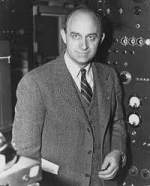
On this day, Enrico Fermi, the Italian-born Nobel Prize-winning physicist, directs and controls the first nuclear chain reaction in his laboratory beneath the bleachers of Stagg Field at the University of Chicago, ushering in the nuclear age. Upon succesful completion of the experiment, a coded message was transmitted to President Roosevelt: "The Italian navigator has landed in the new world."
Following on England's Sir James Chadwick's discovery of the neutron and the Curies' production of artificial radioactivity, Fermi, a full-time professor of physics at the University of Florence, focused his work on producing radioactivity by manipulating the speed of neutrons derived from radioactive beryllium. Further similar experimentation with other elements, including uranium 92, produced new radioactive substances; Fermi's colleagues believed he had created a new "transuranic" element with an atomic number of 93, the result of uranium 92 capturing a neuron while under bombardment, thus increasing its atomic weight. Fermi remained skeptical about his discovery, despite the enthusiasm of his fellow physicists. He became a believer in 1938, when he was awarded the Nobel Prize in physics for "his identification of new radioactive elements." Although travel was restricted for men whose work was deemed vital to national security, Fermi was given permission to leave Italy and go to Sweden to receive his prize. He and his wife, Laura, who was Jewish, never returned; both feared and despised Mussolini's fascist regime.
Fermi immigrated to New York City--Columbia University, specifically, where he recreated many of his experiments with Niels Bohr, the Danish-born physicist, who suggested the possibility of a nuclear chain reaction. Fermi and others saw the possible military applications of such an explosive power, and quickly composed a letter warning President Roosevelt of the perils of a German atomic bomb. The letter was signed and delivered to the president by Albert Einstein on October 11, 1939. The Manhattan Project, the American program to create its own atomic bomb, was the result.
It fell to Fermi to produce the first nuclear chain reaction, without which such a bomb was impossible. He created a jury-rigged laboratory with the necessary equipment, which he called an "atomic pile," in a squash court in the basement of Stagg Field at the University of Chicago. With colleagues and other physicists looking on, Fermi produced the first self-sustaining nuclear chain reaction and the "new world" of nuclear power was born. (History.com)
Stalingrad: The Soviet attempt to split the German pocket at Stalingrad begins. This is carried out by the Don and Stalingrad Fronts with the object of linking up at Gumrak. After five days' heavy fighting virtually no progress is made, and the attacks are called off. Stalin orders a new attack to be prepared. This, code-named 'Ring', is to be a two-phase operation: (1) to liquidate the south and west parts of the pocket; (2) a general assault against the remainder of the pocket. Once again the Don and Stalingrad Fronts are to carry it out, and it is to begin on 16 December.
1943 Various: The Tehran Conference comes to an end. Churchill and Roosevelt knowingly agree to hand over 120 million Europeans to Stalin and the Communists.
World War II: The Luftwaffe conducted a surprise air raid on Allied ships in Bari, Italy, sinking 18 ships and releasing one ship's secret cargo of mustard gas. [For further information, click here]
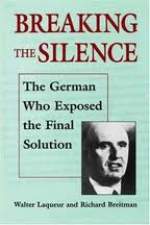
Holocaust: Eduard Schulte, the man who first warned the world about the systematic killing of the Jews, flees to Switzerland after being warned by Eduard Waetjen, an associate of Gisevius, that the Gestapo has ordered his arrest.
1944 World War II: Various:
General De Gaulle (Free France leader) arrives in Moscow:
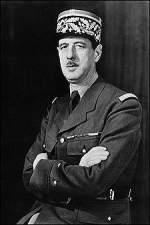
In his dealings with his British allies and the United States, de Gaulle insisted at all times in retaining full freedom of action on behalf of France, even where this might embarrass or inconvenience his partners in the war. "France has no friends, only interests" is one of his best-remembered statements. [Note: Churchill apparently did not say that of all the crosses he had to bear during this war, the heaviest has been the Cross of Lorraine—de Gaulle's symbol of Free France—but it would not have been surprising had he done so.—Ed.]
Stalin to Churchill:

There is every evidence that de Gaulle and his French friends having arrived in the Soviet Union will raise two questions: 1. The conclusion of a French-Soviet Pact of Mutual Assistance similar to the Anglo-Soviet Pact. We can hardly object. But I should like to know your view on this subject. Please give your advice. 2. De Gaulle will probably raise the question of changing Frances eastern frontier and extending the French frontier to the left bank of the Rhine. It is also common knowledge that there is a scheme for forming a Rhenish-Westphalian province under international control. Possibly French participation in this control is also contemplated. Thus the proposal of the French to transfer the boundary line to the Rhine will compete with the scheme for creating a Rhine province under international control. Please give your advice on this question also. I have sent a similar message to the President." 3 December 1944 Stalin to Churchill "The meeting with de Gaulle has provided an opportunity for a friendly exchange on views on Franco-Soviet relations. During the conversations General de Gaulle persisted, as I had expected, with two main questions: the frontier of France on the Rhine and the conclusion of a Franco-Soviet Pact of Mutual Assistance of the type of the Anglo-Soviet Treaty. As regards the frontier of France on the Rhine, I expressed myself to the effect that it was impossible to decide this question without the knowledge and agreement of our chief Allies, whose armies are waging a battle of liberation against the enemy on the territory of France. I emphasized the complexity of a solution to this question. With regard to the proposal of a Franco-Soviet Pact of Mutual Assistance, I pointed out the necessity of this question from all side and the necessity for clarification of the juridical aspect of such a pact, in particular of the question who would ratify such a pact in France in the present conditions. Consequently the French still have to furnish a number of explanations, which we have up to now not received from them. In sending you this information I shall be grateful for a reply from you and your comments on these questions. I have conveyed the same message to the President. I send my best wishes.
Netherlands: German troops seize the Betuwse dikes.
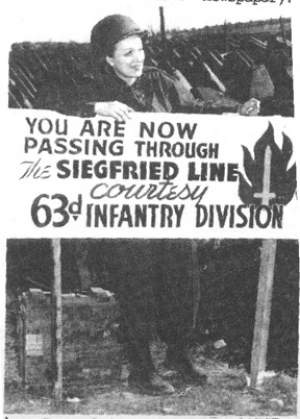
Siegfried line: General George S. Patton's US 95th Infantry division enters the Saar Valley and break through the Siegfried line.
1946 Germany: The United States and Great Britain merge their German occupation zones.
1947 Death: Franz Xaver Schwarz, in an Allied internment camp. One of the 'Old Fighters' and a party member from its earliest days. Nazi party treasurer, 1925. Reich director, 1935.
1954 McCarthy condemned by Senate:

The U.S. Senate votes 65 to 22 to condemn Senator Joseph R. McCarthy for conduct unbecoming of a senator. The condemnation, which was equivalent to a censure, related to McCarthy's controversial investigation of suspected communists in the U.S. government, military, and civilian society.
What is known as "McCarthyism" began on February 9, 1950, when McCarthy, a relatively obscure Republican senator from Wisconsin, announced during a speech in Wheeling, West Virginia, that he had in his possession a list of 205 communists who had infiltrated the U.S. State Department. The unsubstantiated declaration, which was little more than a publicity stunt, thrust Senator McCarthy into the national spotlight. Asked to reveal the names on the list, the opportunistic senator named just one official who he determined guilty by association: Owen Lattimore, an expert on Chinese culture and affairs who had advised the State Department. McCarthy described Lattimore as the "top Russian spy" in America.
These and other equally shocking accusations prompted the Senate to form a special committee, headed by Senator Millard Tydings of Maryland, to investigate the matter. The committee found little to substantiate McCarthy's charges, but McCarthy nevertheless touched a nerve in the American public, and during the next two years he made increasingly sensational charges, even attacking President Harry S. Truman's respected former secretary of state, George C. Marshall.
In 1953, a newly Republican Congress appointed McCarthy chairman of the Committee on Government Operations and its Subcommittee on Investigations, and McCarthyism reached a fever pitch. In widely publicized hearings, McCarthy bullied defendants under cross-examination with unlawful and damaging accusations, destroying the reputations of hundreds of innocent officials and citizens.
In the early months of 1954, McCarthy, who had already lost the support of much of his party because of his controversial tactics, finally overreached himself when he accused several U.S. Army officers of communist subversion. Republican President Dwight D. Eisenhower pushed for an investigation of McCarthy's charges, and the televised hearings exposed the senator as a reckless and excessive tyrant who never produced proper documentation for any of his claims.
A climax of the hearings came on June 9, when Joseph N. Welch, special attorney for the army, responded to a McCarthy attack on a member of his law firm by facing the senator and tearfully declaring, "Until this moment, senator, I think I never really gauged your cruelty or your recklessness. Let us not assassinate this lad further, senator. You have done enough. Have you no sense of decency, sir? At long last, have you no sense of decency?" The crowded hearing room burst into spontaneous applause.
On December 2, after a heated debate, the Senate voted to condemn McCarthy for conduct "contrary to senatorial traditions." By the time of his death from alcoholism in 1957, the influence of Senator Joseph McCarthy in Congress was negligible. (History.com)
1961 Various:

Sentenced To Death: Adolf Eichmann, SS Lieutenant Colonel.
Cuban leader Fidel Castro declares himself a Marxist-Leninist who would lead Cuba to Communism.
1972 Death: Friedrich Christian Christiansen, German Luftwaffe general.
1975 Laos: The Pathet Lao overthrow the royalist government in Vientiane, forcing King Savang Vatthana to abdicate, and establish the Lao People's Democratic Republic. [For further information, click here]
1990 Unified Germany: Election: After German reunification, Chancellor Helmut Kohl's coalition of CDU/CSU and FDP wins Germany's first free German elections since 1932.
1997 Nazi loot: Representatives of 41 countries meet in London to discuss the whereabouts of gold and other valuable assets seized by the Nazi government from Jews in Germany and other occupied countries before and during World War II.
Edited by Levi Bookin (Copy editor)
levi.bookin@gmail.com
FAIR USE NOTICE: This site may contain copyrighted material the use of which has not always been specifically authorized by the copyright owner. We are making such material available in our efforts to advance understanding of historical, political, human rights, economic, democracy, scientific, environmental, and social justice issues, etc. We believe this constitutes a 'fair use' of any such copyrighted material as provided for in section 107 of the US Copyright Law. In accordance with Title 17 U.S.C. Section 107, the material on this site is distributed without profit to those who have expressed a prior interest in receiving the included information for research and educational purposes. If you wish to use copyrighted material from this site for purposes of your own that go beyond 'fair use', you must obtain permission from the copyright owner. Please note that the list-owner and the moderator are not responsible for, and do not necessarily approve of, the random ads placed on our pages by our web server. They are, unfortunately, the price one pays for a 'free' website.


